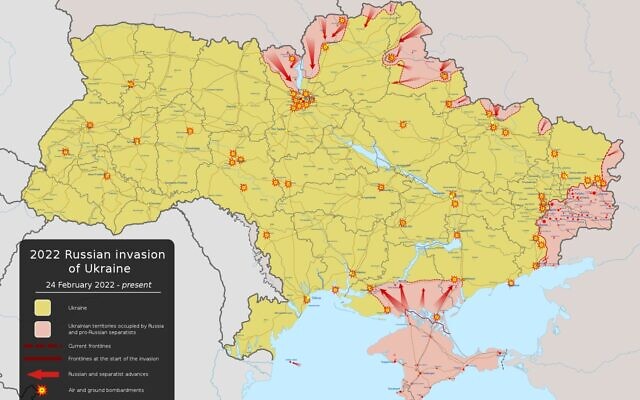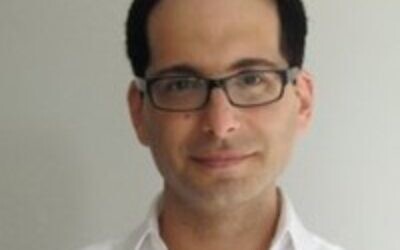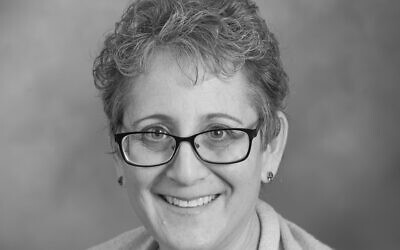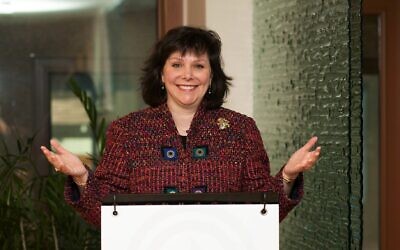Russian Invasion of Ukraine Has Jewish Atlanta’s Attention
Many Atlanta Jews who can trace their family history to Ukraine are paying extra attention to Russia’s military invasion.
Dave Schechter is a veteran journalist whose career includes writing and producing reports from Israel and elsewhere in the Middle East.

An untold number of Jewish Atlantans trace their family history to Ukraine. If not immigrants themselves, then it was their parents, grandparents, or great-grandparents who left Ukraine, often to escape antisemitism, and made their way to America.
That history, however many generations removed, is why many Jews are paying extra attention to Russia’s military invasion of Ukraine.
The Joint Distribution Committee, a relief organization that serves Jews in need around the world, estimates that 200,000 Jews remain in Ukraine. The British-based Institute for Jewish Policy Research estimates that, among 200,000 Ukrainians whose Jewish ancestry makes them eligible for Israeli citizenship under the “law of return,” is a “core” population of 43,000 and another 90,000 with a Jewish parent.

Whatever the numbers, “The situation for the Jews is like it is for their Ukrainian neighbors. Nobody is targeting Jews, but Jewish people are affected as their neighbors are,” Michael Geller, the JDC’s director of media relations, told the AJT on Feb. 24. “They are obviously worried for what will come next.”
The JDC serves about 90,000 Jews across the nations of the former Soviet Union — approximately 80,000 elderly and more than 8,500 children and their families. Nearly 40,000 are in Ukraine, in some 1,000 locations ranging from large cities to villages. Depending on need, assistance might include food, medicine and medical services, home care, emergency assistance and winter relief.
Often referred to as “The Joint,” the JDC also works with significant numbers of Jews in Russia, Moldova and Belarus (in whose capital, Minsk, the Jewish Federation of Greater Atlanta has invested in programs for various segments of that community).

Russia’s invasion of Ukraine could create a potentially sensitive issue, as the JDC aids Jewish elderly and families in both countries, but the agency takes pains to stress the non-political nature of its mission.
Geller would not specify how many staff the JDC has on the ground in Ukraine, but said, “We are concerned for the people that we serve and we are concerned for our staff and we are literally working around the clock to assure their well-being. This is really touching all of us.”
The JDC last year budgeted roughly $65 million for its operations in Ukraine. Asked whether additional resources will be needed, Atlantan Diana Fiedotin, the agency’s senior director of strategic relations, told the AJT, “This is a fluid situation. Whatever we tell you today may not be what we need tomorrow. If the situation continues the way it is right now, we estimate we are going to need $8 million to $10 million above what we would normally spend.”

As if to demonstrate just how fluid, a Feb. 25 statement by the Jewish Federation of Greater Atlanta said: “Initial estimates for immediate and short-term needs are upwards of $20M. Jewish Federation of Greater Atlanta has already allocated money to Ukraine from its Emergency Reserve Fund, but the needs are immense.”
Fiedotin said that “Atlanta supports everything the JDC does.” The agency has been a major recipient of funding allocated by the Jewish Federation of Greater Atlanta. In fiscal year 2021, the Federation gave $944,900 to the JDC; in fiscal year 2020, $1.36 million and in fiscal year 2019, $1.66 million.
“We’re one global Jewish community,” Fiedotin said. “From that perspective, there’s an Atlanta connection. We’re one people.”
The nature of that connection was evident when, at the beginning of a weekly Torah study session on Feb. 24, Rabbi Judith Beiner, the community chaplain for Jewish Family & Career Services, shared Rabbi Nachman’s prayer for peace. She referenced the images emerging from the conflict, such as those of people with their suitcases in a subway tunnel, and spoke of “our hopes that the people of Ukraine find safety, are able to return home and that the conflict end swiftly.”
Link to Rabbi Nachman’s prayer for peace: https://www.rabbinicalassembly.org/story/rabbi-nachmans-prayer-peace



comments